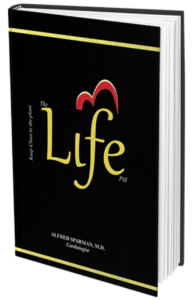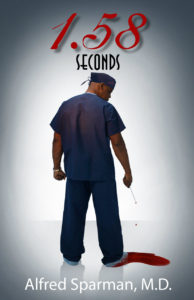
Authors: A. Sparman
Pages: 342
Publish Date: February 2016
Aging. Antioxidants. Natural Herbs.
How they all are connected? The Life Pill Book breaks down complex, scientific concepts to create a simplified guide to ageing focusing on two of the world’s most powerful herbs, Moringa oleifera and Bryophyllum pinnatum. Read More

Authors: A. Sparman
Pages: 306
Publish Date: March 2012
Cardiac surgeon Dr. Sparman has been entranced by Rosa, a Puerto Rican beauty, ever since he first laid eyes on her. Even though it has been some time since he has heard anything from her, he is immediately captivated when she re-enters the quiet, established life he has created for himself; his partner, Isabelle; and his children in Barbados. The renowned doctor has no idea that he is about to sacrifice everything for lust.
After the Doc succumbs to the insatiable chemistry he and Rosa share, lies and deception kick in. His partner confronts him, setting off a chain of events that cause his life to turn upside down. Mesmerized with Rosa’s intoxicating, exotic presence, he tosses all his responsibilities aside and leaves for a week-long trip to Costa Rica with her, where he soon discovers that Rosa is hiding a secret—she wants retribution. As his life hangs in the balance, Rosa tells him that she is not the only one who seeks revenge—there’s also his twin brother, Ashton Read More

Authors: A. Sparman
Pages: 140
Publish Date: November 2010
Dr Alfred Sparman was born to a lower class family in Guyana and migrated to Brooklyn, NY in his early childhood. In “1.58 Seconds”, he uses some of the struggles that he encountered as he journeyed from being a security guard to one of the best interventional cardiologists in the Caribbean. “1.58 seconds” fictionally expresses the integral relationship between living and dying. This fictional novel takes you through nerve ending near death episodes, from the 9mm sig semi-automatic pistol pointed at the chest of a potential patient at point blank range…to the head butt that fractured the facial bones of a would be patient…the 90mph ride on the median of I95 in Florida during stormy weather … Now he is in a frantic battle to save a patient’s (Jimmy Smith) life. Time is against him, every second passing brings Jimmy closer to the other side. With the four minute schedule given to him, would he rupture an artery with his scalpel under such pressure? Could he actually deliver that final blow? Could he actually do the killing??? Only time would tell… Read More
My Published Articles
Manchineel Poisoning Bradyarrhythmia A Possible Association
Authors: A Sparman, J John, L Wills
Issue: Vol 58, Issue 1 (2009)
Pages: 65–6
INTRODUCTION
The manchineel tree (Hippomane Mancinella) is reported to have got its name from the Spanish word ‘manzanella’ whose translation means ‘little apple’. The following article describes a unique case of manchineel poisoning in which a seemingly unknown side effect arose, bradyarrhythmia. Preliminary research showed no cases of ingestion of the manchineel fruit in which cardiovascular complications arose. Cases reported involved blistering, eye irritations, contact dermatitis, oral oedema and respiratory symptoms. Read More
The Initiation of Coronary Angioplasty and Stenting in a Single Outpatient Centre in Barbados
Authors: A Sparman, CV Browne, L Wills
Issue: Vol 57, Issue 4 (2008)
Pages: 332–6
ABSTRACT
Percutaneous transluminal coronary angioplasty (PTCA) is a novel procedure to Barbadian healthcare. Only one centre in Barbados provides PTCA and stenting. This is a retrospective study aimed at describing the initial results of coronary angioplasty and stenting in the first 48 patients at the Carib-American Heart Centre and exploring the feasibility and safety of coronary angioplasty and stenting in Barbados. Forty-eight patients underwent PTCA during the period March 2002 to June 2004 inclusive, with or without intracoronary stenting. Most (64.6%) of the patients were male and 43.7% were diabetic. The most common vessels involved were the left anterior descending coronary artery (LAD) and the right coronary artery (RCA). In one patient, attempted stenting was unsuccessful but PTCA reduced stenosis. One patient had previous PTCA and stenting of the LAD and two patients had coronary artery bypass grafting (CABG) prior to the procedure. Twenty-one per cent of the patients treated had severe triple vessel disease. There were no cases of re-stenosis or acute vessel closure, during or immediately following the procedure that required emergency PTCA or CABG. All patients were discharged within 24 hours of the procedure. Procedural success was 100%. In conclusion, outpatient PTCA and stenting is safe and feasible in the Barbadian population. Coronary artery bypass grafting is still the procedure of choice for treating coronary artery disease (CAD) involving the left main coronary artery but PTCA is indicated in some cases of severe triple vessel disease. Read More
e-Published: 23 Jul, 2013